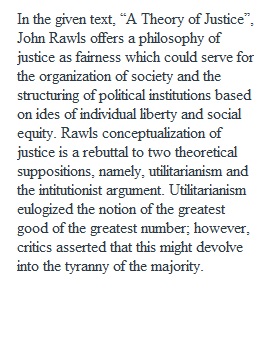


Q For your sixth essay I am asking you to read John Rawl's Theory of Justice, which can be found for free at CSUS website. Your job this week is to put your entire skillset to work. I want you to read Rawl's writings as a philosophical text with a clear argument: a thesis, premises (reasons for believing the thesis), and evidence to support the premises. You should organize your essay to answer the following questions in approximately 650 words: • What do you think the text is arguing? • What evidence is there in the text to support your reading? • What is the meaning of the text's argument? Why? • What implications are there if the argument is true? Why? • Could the text be read as meaning something else? • What reasons might someone give for holding this alternative reading of the text? • Why do you find your original account of the argument and meaning of the text more persuasive than alternative readings? Finish your essay by taking a position of your own. What is your thesis? What are your premises (reasons for believing the thesis is true)? What evidence do you have? Why might someone disagree with you? Why are you unpersuaded. This articulation of your own position should be approximately 150 words in length, and should refer back to the preceding philosophical analysis. Please treat this assignment as one 800 word essay. Be organized. Consistently follow a stylesheet like MLA, APA, or Chicago. You are encouraged to reference the work of Weston in providing an analysis of what is going on in the text. Essay #6
View Related Questions